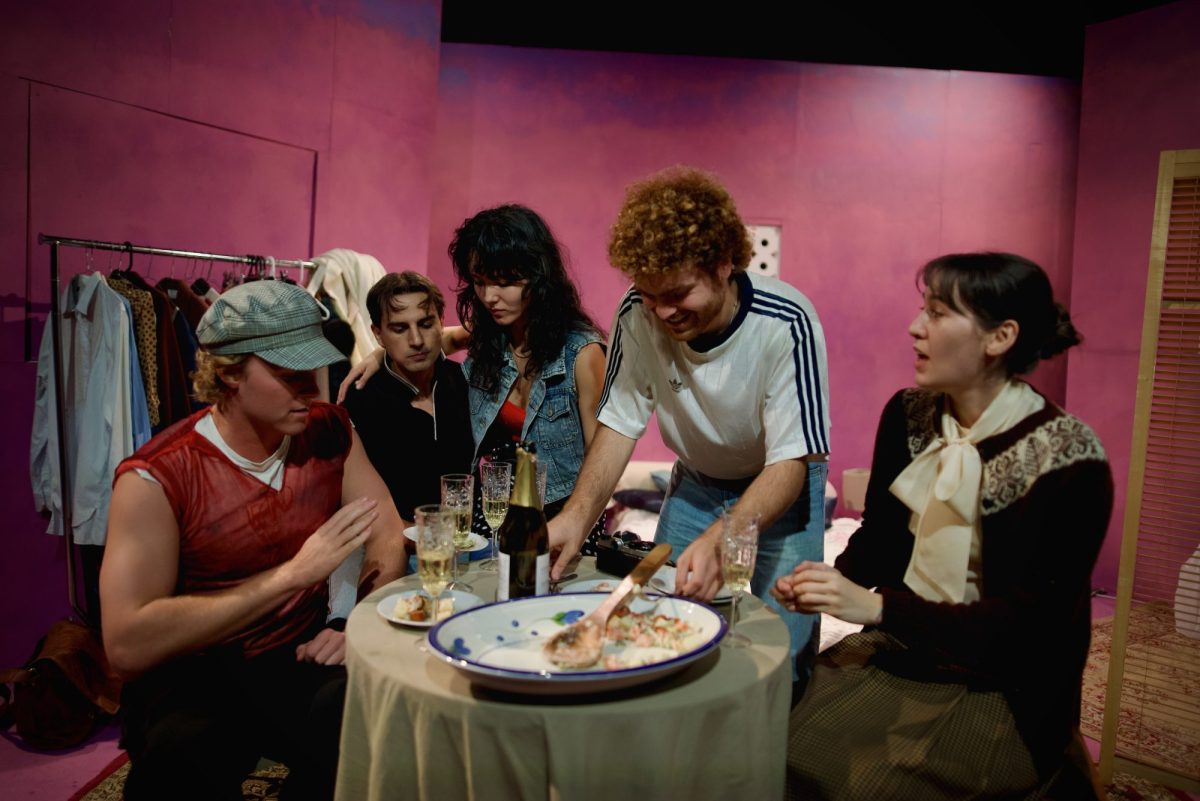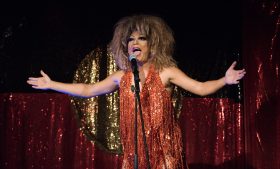Dear Elena Sergeevna, written by Russian playwright Lyudmila Razumovskaya in the 1980s, is part of the Old Fitz Theatre’s late-night program. The play is directed by Romanian actor, Clara Voda, and is the first production from theatre company, Last Waltz Productions – a collective of emerging creatives.
The play is set in the studio apartment of Russian schoolteacher, Elena Sergeevna (Teodora Matović), and the performance space is small-scale, providing a tight area to explore the thesis presented to the audience.
The scenario involves Elena, a single childless schoolteacher with a hospitalised mother, who is alone when she receives a visit from four of her teenage students. They tell her that they are visiting her to celebrate her birthday, but it is quickly revealed that their purpose is to gain access to the exam papers she holds within her apartment.
It seems implausible that a teacher would allow a group of students into their home, but this crossing of the public/private divide is symbolically important to the construction of the play. The teacher is now put in a position of being personally accountable for the system they implement.
Two of the students have performed badly on their exams and they face a dismal existence in the Soviet system if they are not able to contribute to the intellectual collective good of their society. Their bad results mean that they will face a life of poverty, have no control over their own happiness and at least one of them will be conscripted as a soldier.
The group’s ringleader is Volodya (Faisal Hamza), and he does everything possible to persuade Elena through his charm, moral arguments and deceptions to get her to hand over “the key” and change the course of their lives.
Volodya engages Elena with a series of arguments concerning the “correct moral course of action”, but Elena does not cave into the will of her students and holds strong to her moral principles.
Elena presents Volodya with few substantiated counterarguments, but feels justified in maintaining her position. Her view of the students changes from protégées to parasites who have low moral values. They have turned on her and the principles of the system that raised them.
Volodya continually asserts that his behaviour is nothing personal, but just what needs to occur in the quest for power.
When Volodya is unable to convince Elena to remove the obstacle that restricts their freedom, he increases his efforts, using manipulation, coercion, sexual assault and violence as a tool to achieve his objectives. However, the extreme acts of violence played out within his own ideological group result in a loss of support and a loss of power for him.
There are many questions raised within this production, including the overarching one relating to the assumption that someone’s moral position is correct because it upholds the current belief system.
Throughout the production, Elena perceives the students as her ‘children’ – a term she constantly uses to describe them. The question raised is, if she believes that they are her children, then why could she not rebel and challenge the rigidity of a system that had had poor outcomes for them?
Likewise, there are significant problems raised with moral compass of Volodya. Is it acceptable to do anything and everything – including violent acts – in the quest for ideological change and personal power? This is a historically relevant question that remains current in the world of political domination.
The subject matter of the production will not suit everyone, as it has many aspects that require an audience to question the establishment of a political and moral belief system, and then to critically examine the status quo of the system that has become the ideological norm.
Razumovskaya’s use of symbolic and metaphoric references run throughout the production. During the production the students continually refer to their teacher by her full name: Elena Sergeevna. Elena Sergeevna Bulgakova was a Russian intellectual and rebel.
The subject matter is intriguing and stimulating; however, there could be more refinement in relation to the performances because at times there lacks a feeling of flow with conversations that occur between the characters on stage, and these are not always audible.
Read: Theatre review: A Girl’s Guide to World War, Cremorne Theatre, QPAC
Some of the performances come across as a bit clunky. Admittedly, there are moments when this is deliberate, but it does not appear natural and remains contradictory to the intention of the playwright.
Overall, an interesting production that is not without its flaws.
Dear Elena Sergeevna, Last Waltz Productions
Old Fitz Theatre, Woolloomooloo
Writer: Lyudmila Razumovskaya
Director: Clara Voda
Producer: Madeline Li
Designer: Dan Potra
Stage Manager: Justin Li
Vocal Coach: Simon Masterton
Movement Coordinator: Troy Honeysett
Cast: Toby Carey, Harry Gilchrist, Faisal Hamza, Madeline Li, Teodora Matović
Understudy: James Thorn
Tickets: $27.50
Dear Elena Sergeevna will be performed until 11 April 2025.





